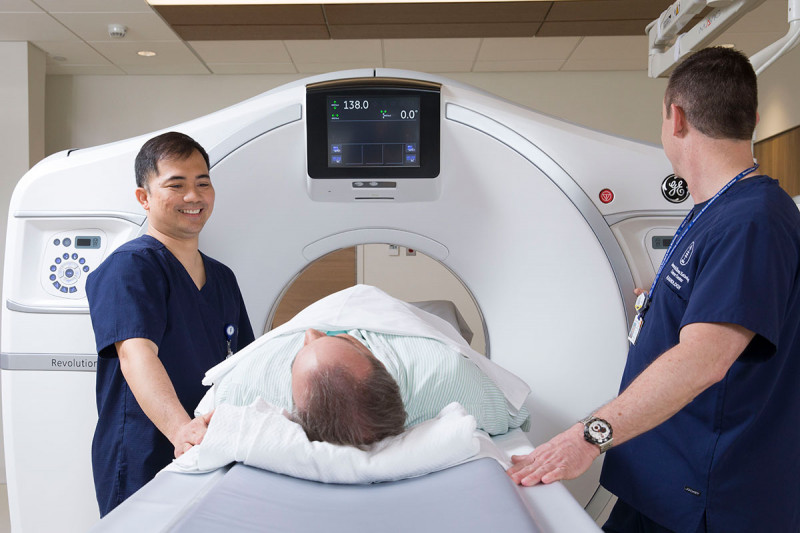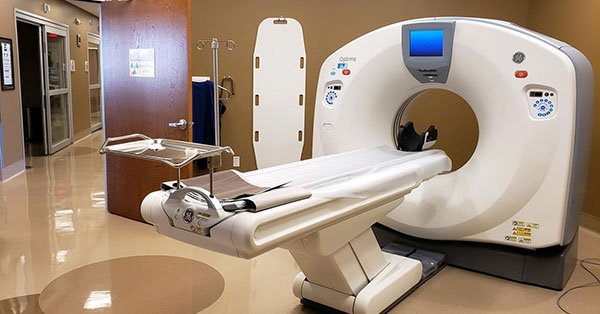- What is CT Scan?
CT scan is a diagnostic medical imaging technique that uses X-rays to produce cross-sectional images of the body. These images are used to detect and locate abnormalities, such as tumors, bone fractures, and calcium deposits in the kidneys or other areas of the body. Why is the CT scan preferred over other x-ray techniques? Because it produces very detailed images, which means the doctor can see more details about an area of the body, such as a tumor, than is visible with other x-ray techniques. Another advantage of the CT scan is it does not use as much radiation as other x-ray techniques. This allows the patient to be exposed to less radiation, which in turn lowers the risk of developing cancer later in life.
- Do You Really Need a CT Scan?
A CT Scan is usually performed as a medical diagnostic tool for people with unexplained symptoms such as persistent cough, chest pain, or severe shortness of breath. Other common reasons for having a CT Scan include cancer screenings, pre-employment/pre-military/pre-driver’s license physicals, and periodic health maintenance exams.
How Does the CT Scan Work?
First, you will lie on a very thick, soft bed which will be moved into the tube-shaped device. This device has a big, circular piece of equipment called a gantry. The gantry has a long, thin tube attached to it. This is the x-ray beam. The gantry is attached to the ceiling of the room in which the CT scanner is located. The ceiling is equipped with very powerful magnets. As the gantry rotates around you, the x-ray beam moves in a circle, taking hundreds of detailed pictures from all directions. These pictures are used to produce the final CT scan image.

- What Should I Expect When Getting A CT Scan?
The actual procedure itself takes only a few minutes. However, there may be some delay before the results are ready. This is because the doctor performing the procedure must interpret the images. Sometimes there is some confusion between interpreting the images and writing up the report. For this reason, it may take one to two weeks before you actually receive the report.
- How much is a CT Scan without insurance?
Basically, you can break down a CT scan cost into two parts: technical fees and professional fees.
- Technical Fees
The technical fees include the cost of the examination, the cost of the medicine used to help you feel less anxious (if sedation is needed), the cost of the film and developing of the x-rays, the cost of the CT Scan equipment, the staff time to operate the equipment, and the radiology professional’s salary and benefits. All of these factors will vary from hospital to hospital and from region to region. The other factor that will impact the cost of a CT scan is the doctor’s fees. These are variable based on what health care plan you have, whether or not you have supplemental coverage, and if you are considered a “high risk” patient. Usually, a CT Scan will cost between $300 and $6,750.
Some people can have a CT Scan for less than $300; however, this is extremely rare. Usually, a doctor will not perform the test unless he thinks it is necessary. Therefore, most doctors charge a fee which covers their time, their equipment, and the cost of performing the test. They will not charge you for their time reading the report or for any follow up visits. What if I don’t have insurance? If you are a patient who does not have health insurance, the technical fees of a CT Scan can still be very expensive. For example, the technical fees for a CT Scan at a hospital with an average cost of $3,000 may end up costing as much as $6,000 or $7000. This is because the hospital may be using a high-priced doctor or radiology professional.
- Professional Fees
The second part of the cost is the professional fees. This is an amount that is determined by many different factors. Some of the factors that go into this fee include the length of time it takes the doctor to read and interpret the images, the number of pictures he needs to examine to come up with a final diagnosis, and his skill and experience level. In some cases, there may be a fee for the doctor to talk with you and answer your questions. Other times, there may be a fee for him to simply explain what the test results mean to you. There is also a fee for him to write a report for you that includes the results of the test, any suggested treatment, and when you need to return for further testing or follow-up exams. These fees can vary quite a bit. Some doctors charge as much as $300 per hour for just reading the scan images and coming up with a diagnosis. Other doctors may charge only $20 or $30 per hour, plus their overhead and business expenses.

The professional fees is also made up of the doctor’s fees and the ancillary staff who interpret the images and write up the report. The ancillary staff usually includes a medical technologist, a radiology resident, and a radiologist. Depending on the hospital, these professionals may range in price from $3,000 to $6,000 or more. Therefore, it is important to know the actual cost of having a CT scan before you decide whether or not it is a good idea for yourself or your loved one. Most health maintenance organizations (HMO’s) do not cover any portion of the cost of a diagnostic imaging procedure such as a CT Scan. This is true even if the test was recommended by your physician or if you have no other health insurance coverage. What we are going to do in this lesson is examine several different approaches you can take when writing an ad or sales pitch to promote a CT Scan.
Some other factors include your geographical location, whether you have a preferred (or “compelling”) reason to have the test done.
One thing is certain though… no matter what… the cost of a CT scan will always be more than a simple X-ray. This is because a CT scan uses advanced technology that creates a much clearer image than a simple X-ray. In fact, a typical CT scan can detect abnormalities… which cannot be seen at all… with just a simple X-ray.
